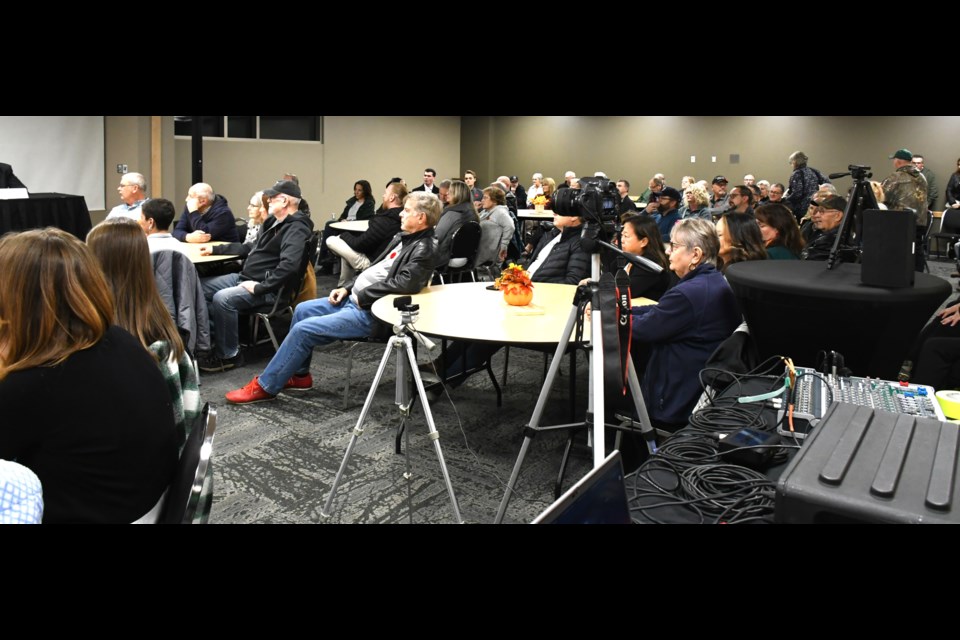MOOSE JAW — Contenders fighting to be Moose Jaw’s next mayor discussed their thoughts on various topics during a forum that the Moose Jaw and District Chamber of Commerce held at the Events Centre on Oct. 29.
Chamber CEO Rob Clark MCed the event, which featured candidates Clive Tolley (incumbent), Crystal Froese, James Murdock, Mike Simpkins and Kim Robinson laying out their vision in front of more than 140 people.
The topics included showing leadership on contentious issues, housing and homelessness, harm reduction strategies, downtown development, fixing the property assessment program, property taxes, the mayor’s role in economic development, supporting seniors and improving city employee morale.
Leadership on contentious issues
Murdock said a “significant moment” in his leadership journey occurred when he attended the community safety meeting in July and spoke against the new Riverside Mission location while speaking for safety, downtown businesses and the Hilton Hotel project of which he is a part.
“I am committed to clearing up misinformation on my stance on this issue, as I believe open communication is essential,” he said.
Murdock supports a new shelter but believes a proper location with wrap-around services is vital to ensure it meets everyone’s needs while offering solutions “the Moose Jaw way” is best.
Simpkins runs a motorcycle training program, which was shut down in March 2020 because of the pandemic. He said he showed leadership by lobbying the provincial government to be included in phase 1 of the reopening plan; his training program was the first in the province to re-commence.
Robinson pointed to his voting record on council and said he doesn’t “blindly follow” every recommendation from city administration but conducts research, seeks out experts and listens to residents before voting. He noted that he received a “less than positive” response from some colleagues for his stances.
“As the old saying goes, if everyone around the table votes yes, then we don’t need everyone around the table,” he added to a smattering of applause.
Tolley was a member of the group that pushed for the Multiplex but faced considerable opposition from the council at that time. He noted that that “team of leaders” had a vision and stuck to it, which resulted in the building’s construction and gave the WHL Moose Jaw Warriors a new home.
Addressing homelessness and supporting less fortunate residents is a “deeply complex issue” since it also affects downtown businesses and residents, said Froese. To find practical solutions, the city must lobby its MLAs and work with the Moose Jaw Police Service and downtown association.
“By bringing people together, I’ve shown that we can turn controversial issues into collaborative efforts … ,” she added.
Housing and homelessness
Simpkins said he didn’t want to support a homeless encampment, nor did he want a new shelter downtown. Instead, he thought the city needed to find a long-term program that was successful elsewhere and support that.
To address the housing shortage, he thought council should cut red tape at city hall, reduce the numerous bylaws and streamline the construction process for developers.
Robinson said the city needs to attract developers instead of chasing them away, as it did with a $50-million, 200-unit housing project. He thought the city should offer incentives to developers to build and that homes should be constructed on in-fill lots, properties taken through tax arrears, and derelict sites.
Said Tolley, “The fact that Joe Miller and Souls Harbour left Moose Jaw … is a good thing because we now have Moose Jaw people working on a Moose Jaw solution to the problem.”
He noted that Moose Jaw Non-Profiting Housing Association (MJNPHA) and Square One Community Inc. are working to provide shelter, while Hope Ministries — comprised of former Riverside Mission staff — is working with churches to offer meals. These organizations, he emphasized, are offering a local solution.
Meanwhile, Tolley said the community doesn’t have a housing shortage crisis since apartments are going up in West Park and near the Old Union Hospital site while lots are for sale in Westheath. He thought the market should handle any perceived housing problems.
Froese said council’s role should be to support these community organizations while lobbying for provincial funding. She also agreed that the city should offer incentives to developers.
Murdock said the city should make it easier for developers to ease the housing strain by approving permits faster and having land ready to go, including using more in-fill lots.
With homelessness, he thought good dialogue was needed with the province, city administration and organizations at “Ground Zero” to tackle this issue.
Harm reduction/safe injection sites
Robinson said he opposed safe injection sites but favoured a program that offered addicts wrap-around services and work skills.
“We really have to lift these people up, not just give them a warm bed, a sandwich and a bowl of soup,” he added.
Tolley said he also opposed such a site. Meanwhile, he said this is a provincial government responsibility, so council must have a good relationship with its MLAs and the premier. He also thought that MJNPHA and Square One were best positioned to handle this situation.
Froese — who didn’t give a position on safe injection sites — agreed that this is a provincial issue. However, she thought council could support the front-line agencies working with less fortunate people.
Murdock agreed that the province needed to offer help in this area. He also thought that the community needed to ensure that people receiving addiction help didn’t relapse or return to “their enablers.”
Simpkins said he opposed safe injection sites, especially since data from Europe shows harm reduction fails people. He thought that a long-term treatment program was required so addicts stayed long enough to become clean and potentially join the workforce.
“If we don’t get to the root of the problem, we’re never going to (address this issue) … ,” he added.




